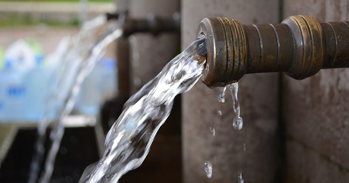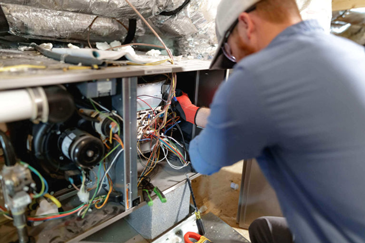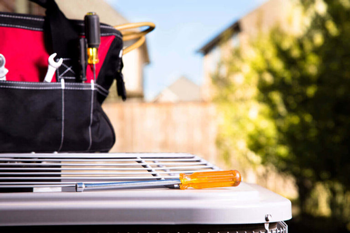WHY IS MY AIR CONDITIONER LEAKING Water? 3 COMMON AC PROBLEMS
Apr 13, 2020
As you begin to kick your air conditioning system back on in the spring, you’ll need to make sure that it is ready to go. One crucial step in preparing your AC to function properly is to prevent any leaking. Potential leaks can indicate your HVAC unit has an issue and cause costly water damage in your home. If you notice your AC unit leaks while it’s running, find out more about the common causes of leaks and how to fix them.
Why Do AC Systems Produce Water?
Your air conditioning system is responsible for taking the warm outdoor air and cooling it as it passes into your home. Warm air can hold more water molecules than cool air (especially in humid climates). As the warm air passes over the evaporator coil and transitions to a cooler temperature, the air molecules begin to shed this excess water.
While it might not seem like the air can hold too much water, your system can produce as many as 20 gallons of water a day. This number depends on the volume of air your system is producing, the humidity outdoors, and the temperature you have your thermostat set to. Thankfully, your system is designed to effectively drain this water and release it back outdoors. However, when it’s not properly functioning, it can start to leak water into your home.
3 Common AC Problems Behind an AC Unit Leak Water
While air conditioners are designed to drain water and keep your home safe from water damage, they can sometimes suffer from a few problems that lead to a leak. For example, clogged drain lines, damaged drain pans, and frozen evaporator coils can all cause an AC unit to leak water. Find out more about these common problems behind an AC dripping water below:
Problem 1: Clogged or Damaged Drain Line
 Your condensate line (or drain line) is the piece of your air conditioner that carries your excess water outside. When the line becomes clogged or damaged, the water will overflow back into your home instead of being deposited outdoors.
Your condensate line (or drain line) is the piece of your air conditioner that carries your excess water outside. When the line becomes clogged or damaged, the water will overflow back into your home instead of being deposited outdoors.
Since your drain line connects your indoor unit to the outdoors, the line is relatively small to keep any unwanted critters from entering your home. The line’s small size makes it easy for sediment, debris, algae, and mold buildup to clog it. Without proper maintenance and care, your drain line may become clogged regularly.
Signs of a Clogged Drain Line
If you notice a full drain pan, a water leak, or excess water surrounding your AC unit, you might have a drain line issue. When your drain line is clogged, it could also activate a float switch in your unit. This switch will shut down your air conditioner or cause it to produce warm and humid air. You may also notice a moldy smell as the water begins to seep into your walls or flooring.
Solution: Clear the Clogged Drain Line
When a clogged drain line leak occurs, you need to immediately shut off your system if it didn’t automatically do so. Next, you should clean up any excess water in your home and call a plumber if you suspect any water damage has occurred. To get your unit functioning properly, you need to remove the blockage in your drain line and clean the system of any mold. Since clearing a clogged drain line can be difficult, contact a local air conditioning technician to do it for you.
Problem 2: Damaged Drain Pan
Before being carried outdoors through your drain line, condensation gathers in your drain pan. If there is a leak, hole, rust, bend, or damage in your drain pan, it may not effectively catch the excess water and guide it to your drain line. Instead of catching and removing the water, a damaged drain pan will allow the water to leak indoors.
Signs of a Damaged Drain Pain
Your drain pan should be visible for you to see at the base of your unit. If you notice any visual abnormalities, the pan is likely damaged. One major sign of a damaged drain pan is if it’s overflowing. However, you’ll also want to look out for a completely empty drain pan. In cases of severe damage and wide gaps, a drain pan won’t have any water in it despite the excess water your system is producing.
Solution: Drain Pan Replacement or Repair
 If the drain pan is only moderately damaged, an expert may be able to repair it. However, this issue often requires—at the very least—a drain pan replacement since rust and old age are common sources of drain pan problems that can’t be fixed. If your unit is old, rusted, and experiencing multiple issues, you may opt to replace your AC system entirely. An expert can walk you through your options and help you arrive at the best solution for you.
If the drain pan is only moderately damaged, an expert may be able to repair it. However, this issue often requires—at the very least—a drain pan replacement since rust and old age are common sources of drain pan problems that can’t be fixed. If your unit is old, rusted, and experiencing multiple issues, you may opt to replace your AC system entirely. An expert can walk you through your options and help you arrive at the best solution for you.
Problem 3: Frozen Evaporator Coil or Equipment
Have you ever noticed ice forming on your air conditioning unit? When your AC system can’t effectively release the cooling properties it’s producing, your evaporator coils or other components of your unit begin to build up ice. Eventually, your unit will turn off, catch a break, or start to shut down. Once the unit stops working, the ice around your evaporator coils and equipment will melt and release water into your home.
There are three primary causes of frozen evaporator coils:
- Dirty Air Filter: When an AC unit's air filter is dirty, air will struggle to pass through it, causing your unit to start working harder to produce cool air. As this cold air lingers around your system, it will begin to freeze the condensation around the evaporator coils.
- Dirty Evaporator Coils: Dirt on evaporator coils serves as a type of insulation. Rather than cooling your air, the refrigeration will become trapped and begin cooling your system internally. This internal cooling will cause freezing and ice buildup.
- Refrigerant Levels: The refrigerant in your unit creates the pressure your system needs to stay moving and functioning. When this pressure drops because of low refrigerant levels, your internal unit temperature drops accordingly. This drop in temperature will cause your unit to freeze.
Signs of an Evaporator Coil, Air Filter, or Refrigerant Issue
Frozen AC equipment is the number one sign of an evaporator coil, air filter, or refrigerant issue. Much like any other AC issue, your unit will become ineffective or may shut off due to frozen evaporator coils. If you have low refrigerant levels, a major sign is higher electric bills. For air filter or coil issues, you might notice visible signs of dirt and blockage.
Solution: Air Filter Replacement, Refrigerant Care, or Coil Cleaning
The solution here depends on the source of your issue and any further damage that it may have caused. At best, you may simply need an air filter replacement. If the issue is with your evaporator coil, it may need to be professionally cleaned to restore the unit’s function while avoiding damage.
You may also need replenished refrigerant levels or repairs for any refrigerant leaks. If these problems have caused deeper issues with your AC system, an expert will need to inspect and repair any resulting problems. To minimize the damage these issues can cause your system, you’ll want to prevent them by catching them early with regular professional HVAC maintenance.
Is Your Air Conditioner Dripping Water? Contact Newcomb and Company for AC Service in Raleigh
Now that you know why your AC is leaking water, turn to the experts at Newcomb and Company whenever you need AC repairs in Raleigh, Wilmington, or the surrounding areas. Since our professionals are available 24/7 to serve homes and businesses, you can contact us as soon as you notice your AC unit leaking water to have your AC repaired as fast as possible. Besides our HVAC repair services, you can also hire our expert plumbers to help with any water damage caused by AC leaks.
Learn more about our HVAC repair services and regular maintenance services today. If your air conditioner is dripping water, contact us to schedule service and have your AC repaired fast.
Need help? Call now.